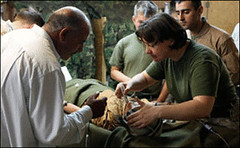By Cpl. Antonio Rosas 1st Marine Division
CAMP AL QA'IM, Iraq — For a 12-year-old Iraqi girl in need of a kidney and liver transplant, time is the enemy. Her friends are a team of U.S. Marines and Sailors who have applied their medical skills to help the keep the girl alive.
Hadael Hamade is in desperate need of surgery, say U.S. Navy physicians who have treated her in recent months.
The girl first befriended Marines from 1st Battalion, 7th Marine Regiment, months ago when the Marines were on patrol in Karabilah - a city of about 30,000 near the Iraq-Syria border.
“When we first saw Hadael several months ago, she was walking,” said Navy Lt. Mark D. Rasmussen, an anesthesiologist with the surgical suite here. “Now she can’t move much. The Marines needed to carry her from her house to the Humvee, and from the Humvee to the surgical suite here.”

Since then,U.S. military forces here have regularly checked-up on the girl, evaluating her condition.
ReplyDeleteHadael’s father, Ahmed, a 46-year-old school teacher, sought the aid of Marines and Sailors, stating that doctors in his country cannot help his daughter.
After losing four children to kidney disease, he’s not ready to let Hadael suffer the same fate as her brothers and sisters, he said.
“If I need to go to outside of Iraq to help my daughter, I will go,” said Ahmed through an interpreter. “I will do anything to help my daughter stay alive and I am thankful for anyone that wishes to help me in any way.”
The girl needs immediate surgery and regular medication to sustain her. The procedure and follow-on care, however, could cost hundreds of thousands of dollars – money Hamade’s family doesn’t have, and medical treatment Iraqi doctors are unable to provide, according to Ahmed.
Hadael recently received medication donated by several U.S. non-government agencies which doctors say will prolong her life a bit.
But the medicine is a temporary fix to a much larger problem. Without a kidney transplant and further treatment, Hadael will die, said Navy Capt. H.D. Elshire, the officer-in-charge of the Marines’ medical facility on camp.
“If she doesn’t get it soon, her chances of survival are pretty dismal,” said Elshire. “There is no help for her here in Iraq as the doctors in Baghdad don’t have the resources to help her.”
Still, a successful surgery would be just the start of a lifetime of medical care. Funding for her medications and treatment could present an overwhelming drain on her family.
Hamade’s case has recently garnered attention in the U.S. after several non-profit organizations and a congressman from California learned of her situation. It was first brought to their attention upon the death of a Marine killed near Karabilah, who just days before had vowed to help the girl by bringing her to the attention of his chain-of-command.
Lance Cpl. Aaron W. Simons, a Marine rifleman, met the dying Hadael during a midnight security patrol through the city, according to her father.
Simons befriended the family and wanted to help Hadael’s father find treatment for his daughter, according to Simons’ best friend, Cpl. Ian Kutner, who also visited the family several times.
“I remember the young Marine and how he was interested in getting help for my family,” said Ahmed. “I am very sorry for his death. Without him I would have never gotten help for my daughter.”
Due to a lack of sophisticated medical resources in the region, four of Hadael’s siblings have died from the same hereditary kidney failure now claiming her life, Ahmed said.
The disease, called “Oxalosis,” began in Hadael’s liver, where it limited the organ’s metabolizing capabilities. Her other organs were affected in turn - especially her kidneys, which suffered permanent failure. The disease has drained the girl’s energy, and caused her to appear weak and small for her age, U.S. doctors say.
The disease is prevalent in the Middle East and is the leading cause of renal (kidney) failure in Iraq, according to Elshire.
Ahmed sought the aid of the Americans because professionals in Iraq have already given up on saving his daughter’s life, he said.
“She is alive right now because of the Americans,” said Ahmed. “My other children died because there is no medicine here in Iraq.”
For now, Hadael has enough medicine for the next six months, thanks to donors in the U.S. But surgery remains the only hope for a long-term solution.
“She needs a kidney-liver transplant now,” said Elshire. “The longer they wait for a donor, the less chance she has of living.”
Even if Hadael receives a financial sponsor and medical institution willing to perform the surgery, there is a likelihood her whole family may have to relocate outside of Iraq in order for her to receive the long-term follow up care she will require.
For the time being, Hadael will continue to make regular trips to the Marine base to receive her weekly medicine.
For their part, the Marines say they will continue to visit Hadael’s family from time to time.
Hadael’s father says she doesn’t play with the other kids in her neighborhood and doesn’t smile much anymore, although when the Marines come around she smiles a bit more.
Staring at his daughter as she lies on a green stretcher, receiving medication inside the Marines’ medical facility in Al Qa’im, Ahmed says that now “all that is left to do is wait.”